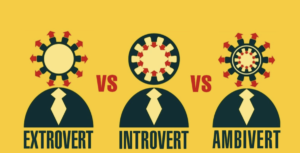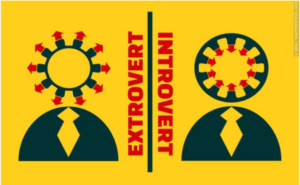Fundraising for Introverts
A conversation between the author Brian Saber (an introvert)
&
Katherine DeFoyd (an introverted-extrovert, aka ambivert)
Spoiler Alert: Introverts make great fundraisers and leaders!
Brian Saber, president of Asking Matters, recently published Fundraising for Introverts: Harnessing Our Powers for What Matters. This look at successful fundraising strategies builds on Brian’s already impressive life’s work with his company, Asking Matters – helping people determine their personal asking style and improve their approach to fundraising. With this new book, Brian’s inquiry into the art and science of fundraising continues to offer incredible insights.
We are happy to share a conversation between Katherine DeFoyd and Brian Saber.
Katherine:
First of all, congratulations on your book, and huge congrats on its Amazon ranking of number one bestseller in the nonprofit category. That’s a huge accomplishment. Tell me about Fundraising for Introverts.
Brian:
The book is my effort to even the playing field and make sure that everyone understands that introversion doesn’t mean anything negative in the fundraising world. It just means different. Introverts have many strengths that extroverts don’t have. Together, we can all be successful in fundraising.
Katherine:
What motivated you to write this book?
Brian:
I am an introvert, though people generally don’t see me that way because I have very good social skills and I speak a lot in public. People equate that with extroversion. I had a personal perspective along with knowledge from the journey that I’ve been on all these years that helped me understand and appreciate myself. After developing the Asking Style and Asking Matters, which are somewhat based on extroversion and introversion, I had a deeper understanding of these concepts. I felt even more passionate about setting the record straight. It was time to write a book, especially given my personal experience as an introvert.
Katherine:
According to the Myers-Briggs Type Indicator, I happen to be an “Introverted-Extrovert,” also known as an “Ambivert.” So, I understand both sides of the personality spectrum. I appreciated the book and that you thoroughly define introverts and extroverts and those of us who are actually both.
Katherine:
Can you spend some time on your definition of introvert versus extrovert as it relates to fundraising and life?
Brian:
Regarding extroversion and introversion, there are a few ways to examine the differences, and they’re all related. We often say that extroverts talk to think and introverts think to talk, meaning extroverts process out loud, whereas introverts like to process first in their minds and then speak.
An introvert’s tendency, all things equal, would be to take more time before we insert ourselves into a conversation. However, in most conversations, there’s a certain rhythm. Introverts often need to speed up, and that uses a lot of our energy. The second reason we’re using a lot of energy on the conversation has to do with neural pathways. I learned a lot about brain science researching this book. It turns out that introverts have longer neural pathways, meaning when we think about something, we go deeper and further into our memories to come up with our thoughts and answers. Overall, that takes more energy and more time. And that is the science behind why we think to talk.
Related to this is this concept of neurotransmitters. We have dopamine and acetylcholine in our system. Dopamine is the feel-good enzyme that responds to external stimuli, which is why extroverts get very excited about external things. Introverts are more responsive to the acetylcholine in their bodies. That is the internal feel-good enzyme that gives you a reward and satisfaction from something that you think of or feel internally.
We’re wired differently, in terms of where we get our stimulation. When introverts are getting their stimulation externally, it’s using up a lot of energy. When extroverts get that external energy from other people and situations, it increases their energy. Combined, all of this leads introverts to look for quieter conditions. We get more satisfaction overall from ourselves and our thoughts and quiet situations, from one-on-one conversations where we have more time to think, than at big social events. Our rhythms are different.
Katherine:
So, what message do you have for extroverts- in relating to introverts?
Brian:
Extroverts can learn to appreciate the fact that introverts are going deep, and we’re being very thoughtful before we speak. Our silence only means we’re taking our time to think. Introverts might really get wiped out from a social event, but that is balanced by how much reward we get from deeper one-on-one relationships. This is not to say that extroverts don’t find reward in one-on-one relationships; they do. But introverts seek that out more and spend more of their time in those one-on-one relationships, and they tend to have deeper relationships.
There’s one other point here, and it has to do with listening versus talking. In a conversation, we’re either listening, or we’re talking ourselves. Hopefully, we’re listening if we’re not talking. Introverts tend to speak less and listen more. In fundraising, we all know that listening is one of the most important skills. We want to learn from donors, not barrage them with facts about our organization. That’s not going to build a relationship. In fact, introverts often have a leg up in building relationships with donors by being more comfortable with the silence and letting donors talk.
Katherine:
I am so lucky to have started my fundraising career working at NYU for the famous Naomi Levine. I suspect Naomi was an introvert, even though she was very outspoken and not shy at all. Naomi used to give us little lectures about being a good fundraiser. She often said, “God gave you two ears and one mouth for a reason.” Being a great fundraiser is absolutely about listening carefully. We extroverts need to zip it up and pay attention. Fundraising is about putting the donor first and listening to their story and connection to the mission.
This is an excellent segue to my next question. As you know, at Growth for Good’s sister company, Search for Good, we’re doing a lot of searches – for executive directors and development directors. It’s important to consider introverts as executive directors who should be spending 50% of their time fundraising.
Katherine:
How might someone contemplate introverts versus extroverts when hiring an executive director or a development director?
I ask this because we often warn our clients to be “leery of the shiny bright objects.” Extroverted people with charisma can really excel in an interview. Yet, often, they’re not the best person to lead a team. Similarly, for a development director, a great fundraiser is someone who puts the donor ahead of themself, someone who is a little more focused on everything around them. I say that with love and kindness to my fellow extroverts! Talk to me about how someone might contemplate personality styles when they’re hiring an executive director or a development director.
Brian:
First of all, we have to stop devaluing 50% of the population – by that I mean the introverts. Studies have proven that introverts do not work their way up the hierarchical ladder of a corporation as quickly or as far. The further up the ladder you get, the fewer introverts you get. There could be a slight bias that introverts may not want to be at the top. It’s been proven that there’s a bias against them by their supervisors and in society.
We have to get past the bias. I have a wonderful example from a search I was involved in recently. One of my clients was looking for two major gift officers. One of the finalists was quieter and absolutely an introvert. There was an inherent bias against her, but at the end of the day, we engaged her. She’s doing incredibly well because she’s building relationships, which is exactly what she’s supposed to do.
So, number one is to get past the bias and not give extra value to either, because no one has it all. When you’re looking at executive directors, everyone has strengths and challenges. We know this because the longer someone is the head of an organization, the stronger they get in some areas and the weaker they seem to get in others unless they have an incredible team.
In most cases I followed over the last few decades when the long-term executive director leaves, some things are amazing. However, other things could be better and need a lot of work. Sometimes it’s the financials, sometimes it’s the fundraising, sometimes it’s the human resources. Sometimes, it’s the connection to the community because we all have strengths and challenges. We do well where our strengths are, and if we’re smart, we try to find people who complement us and fill in where we have challenges.
The proof is in the pudding when executive directors leave, and we see that whoever we thought was incredible at the beginning was great at some things and not good at others. Sometimes, we learn and fill those blanks in, but other times, we just play our strengths, and that’s it.
Wherever I have gone as a fundraiser or an executive director, we have not done much on the fundraising event side. All things equal, we could have made more money if, in addition to everything I did, we had a fancy fundraising event. We didn’t because I was not too fond of the thought of them. We did amazingly well with individual donors and capital campaigns. Still, we may have left some money on the table in fundraising events. My successor, perhaps, was better at those and maybe started one that was very successful and added to the pot.
Katherine:
I think a lot about this charisma issue, especially when hiring, because we’re often tasked with finding a charismatic leader. I get impatient with the quest for charisma. It could be because I am an introverted extrovert, and my introverted side is suspicious of some charismatic people. I think about a great quote from Iris Apfel, the famous fashion icon. I once saw an interview with her and she was told by someone early in her career, “You’re not going to make it in fashion. You’re not very pretty.” She said, “Pretty is overrated.” I love that coming from a fashion icon.
I feel that way about charisma in leadership and fundraising, particularly because some charismatic people can be very self-absorbed. Not all of course. The self-absorbed variety is not necessarily the best leader or manager because they’re more about themselves than they are about others. If you look at Ted Lasso and what a great coach he is, he is not a charismatic guy, according to the classic definition of charisma. In an interview, it is hard to know which category a charismatic person falls into – self-absorbed or not self-absorbed. Talk a little about that and dig into introverts versus extroverts and how people should be cautious of thinking only about the charismatic extrovert as a leader.
Brian:
The charismatic leader may or may not be self-absorbed but maybe more to the point, may not go deep. Some charismatic people are all over the place. And I don’t mean that in a negative way, but they’re out there a lot, and people are enthusiastic about them, but they may not be going deep. I don’t want to say it’s about them necessarily, but in truth, they’re acting on a certain level and maybe not other important levels.
Very charismatic leaders also can overwhelm the rest of their staff, so that’s another challenge. Often, whether they mean it or not, it becomes more about themselves; the focus is on themselves.
A good manager should put the focus on the people they’re managing. You want to try and raise up the people who work for you. You want to put them on a pedestal; you want to make them feel good about their work. Charismatic leaders sometimes do take more of that attention for themselves just because of who they are. They’re not necessarily asking for it; it’s just they have this energy, and people are attracted to it. So, you do need to be careful with that.
In fundraising, in particular, it has to be about the donor. People will follow a charismatic leader to a certain point and be excited by their work. But it’s a slippery slope, and it can get dangerous. Sometimes, those relationships can get burned because, all of a sudden, the donor feels, “I’m not being seen; I’m not being honored.” It can turn in a moment into, “Oh gee, it seems to be all about the executive director.” It’s hard to reel it back from there.
Certainly, in fundraising positions, a little charisma goes a long way. Interestingly, you talked about Naomi Levine because Jerry Panis, perhaps the most famous fundraiser of all, certainly in terms of the books and his longevity, was actually an introvert. The proof is in the pudding!
Katherine:
My favorite passage in the book – and this is the extrovert in me – is the section about my annual Christmas party and how you like to bring the ice. Your strategy as an introvert is to arrive early and bring the ice as a way to navigate the scene. You end the anecdote with having once arrived later when the party was in full swing. How, as an introvert, did you navigate that party and others where conditions might not be what you prefer?
Brian:
There’s another account in the book where I talk about how I handle these situations. I always commandeer one person, hopefully, someone I know already. I corner them and talk to them for as long as they let me. This is in the hopes of not having to speak to anyone else the rest of the time. And that’s what I do at every party. I will try to find someone who also is happy just talking to one person, and I will stand off on the side.
Katherine:
As an ambivert, I do the exact same thing at parties – or just avoid them altogether…
What advice do you have for introverts who are fundraisers or who want to be fundraisers?
Brian:
Go out there with confidence. You have incredible skills. We rock, so please stop thinking, “Oh, I’m an introvert. I can’t fundraise,” or “I’m not going to be as good as my extrovert counterpart.” You are, and we need you. We have so many nonprofits now, and we need you to feel confident as being part of our nonprofit world.
Katherine:
What message do you have for extroverts in appreciating introverts?
Brian:
Appreciate us for who we are. We appreciate you. We admire your extroversion and the way you go through the world. We sometimes envy it, but there’s much to envy about us as well.
Katherine:
Where can people buy the book?
Brian:
Wherever books are sold, it’s available in paperback and e-book HERE. E-books would be through the major online retailers, but you can also order from your local bookstore.
Katherine:
For those extroverts who maybe don’t want to read the book, when are you speaking? When will the book be an audiobook? Do you have any webinars coming up?
Katherine:
Thank you, Brian.
Recent Posts
Subscribe to Our Newsletter
* These fields are required.
Contact Us
500 Summit Avenue
Maplewood, NJ 07040
P: 973-762-7645
E: contact@growthforgood.com











